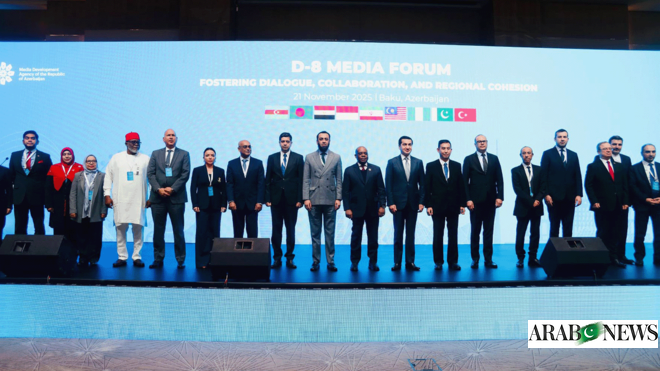Listen to the article
Pakistan’s Information Minister has called for a joint fact-checking platform among the Developing-8 nations to combat misinformation, speaking at a media forum in Azerbaijan’s capital.
Addressing delegates on the sidelines of the D-8 Media Forum in Baku, Information Minister Attaullah Tarar emphasized the urgent need for a coordinated approach to counter fake news across the eight Muslim-majority developing economies that make up the bloc.
“Countering fake information, false information is very important,” Tarar said. “We have come up with a system where I have proposed that we need to have a social media handle or an account of joint D-8 countries in which we can call out fake news.”
The D-8 Organization for Economic Cooperation, established in 1997, includes Bangladesh, Egypt, Indonesia, Iran, Malaysia, Nigeria, Pakistan, and Türkiye. The group represents a combined population of approximately 1.1 billion people across three continents.
Pakistan is positioning itself for a leadership role within the organization as it prepares to assume the D-8 secretary-generalship in January 2026. Tarar urged member states to develop a unified approach to strengthen their resilience in an increasingly complex global information ecosystem.
This year’s forum in Baku focused on capacity building for journalists, enhancing media ethics, and preparing newsrooms to adapt to rapidly changing information technologies and challenges. The minister’s proposal comes amid growing global concerns about the proliferation of disinformation and its effects on social cohesion and democratic processes.
Beyond fact-checking, Tarar suggested creating D-8 social media channels to highlight economic development, counter extremism, and collectively address Islamophobia. He cited Pakistan’s recent reforms, particularly in tax administration, as examples of how digital governance can enhance public trust in institutions.
When questioned about concerns within Pakistan’s media community regarding censorship and regulatory overreach, Tarar defended his country’s media environment.
“Pakistan has a very vibrant, very free media,” he said. “Everyone is free to say what they want. But you know as a Pakistani I believe that when it comes to the safety and security of the country, when it comes to state institutions, when it comes to the defense of the country, this is something on which there should be total unanimity.”
While acknowledging that his government welcomes political criticism, he noted that Pakistan maintains defamation laws and regulatory frameworks that must be respected. “There are regulations which one has to adhere to. But, having said that, I think there is a lot of room in Pakistan to say whatever one wants,” he added.
Press freedom organizations have frequently raised concerns about media restrictions in Pakistan, with journalists reporting harassment, intimidation, and self-censorship, particularly on topics related to the military, security services, or sensitive political issues.
Tarar also addressed a recent International Monetary Fund report on corruption in Pakistani institutions, describing criticism of the report as “misplaced” since the government itself had requested it.
“It was a report commissioned by the government for its own good, an advisory report which has pointed out the areas which need improvement,” he explained, highlighting recent anti-corruption measures implemented by the current administration.
These include a “faceless appraisement system” for import and export clearances, which prevents officials from knowing the identities of those seeking customs clearance, reducing opportunities for bribery. Additional reforms include technological improvements within the Federal Board of Revenue and merit-based transfers and postings.
The information minister expressed optimism that these measures would improve Pakistan’s standing in forthcoming corruption rankings by Transparency International, provided the reform momentum continues.
The D-8 Media Forum represents an important platform for member states to coordinate their information strategies at a time when digital technologies are transforming both media consumption and production across the developing world.
Fact Checker
Verify the accuracy of this article using The Disinformation Commission analysis and real-time sources.




9 Comments
Kudos to Pakistan for taking the lead on this initiative. Misinformation is a global problem, and a collaborative regional approach could be an effective model. However, the devil will be in the details of how the platform is structured and governed.
Agreed. Securing buy-in from all D-8 members and maintaining impartiality will be critical challenges. I hope they can overcome them to create a truly impactful fact-checking initiative.
This is a timely and important proposal, given the proliferation of misinformation, especially in the digital age. A joint platform could help strengthen the resilience of D-8 economies against the impacts of fake news. However, the success will depend on the platform’s credibility and reach.
Fact-checking is crucial, but a regional platform may face challenges in establishing trust and legitimacy across diverse member states. I wonder how they plan to ensure the platform remains objective and not influenced by individual national interests.
That’s a valid concern. Developing clear and transparent protocols for the fact-checking process will be essential to build confidence in the platform’s findings.
Interesting proposal from Pakistan to establish a joint fact-checking platform among the D-8 nations. Combating misinformation is crucial, especially for developing economies. I wonder how the platform would work in practice and what challenges it might face in getting buy-in from all member states.
Agreed, a coordinated regional approach could be effective. However, ensuring transparency and credibility of the fact-checking process will be key to its success.
This seems like a pragmatic initiative to address the growing problem of misinformation, which can have serious consequences for economic and social stability. I’m curious to see how Pakistan plans to get the other D-8 nations on board and what the proposed funding and governance model would be.
A joint fact-checking platform could be a valuable tool, but the execution will be critical. Maintaining impartiality and avoiding political interference will be crucial for its credibility.